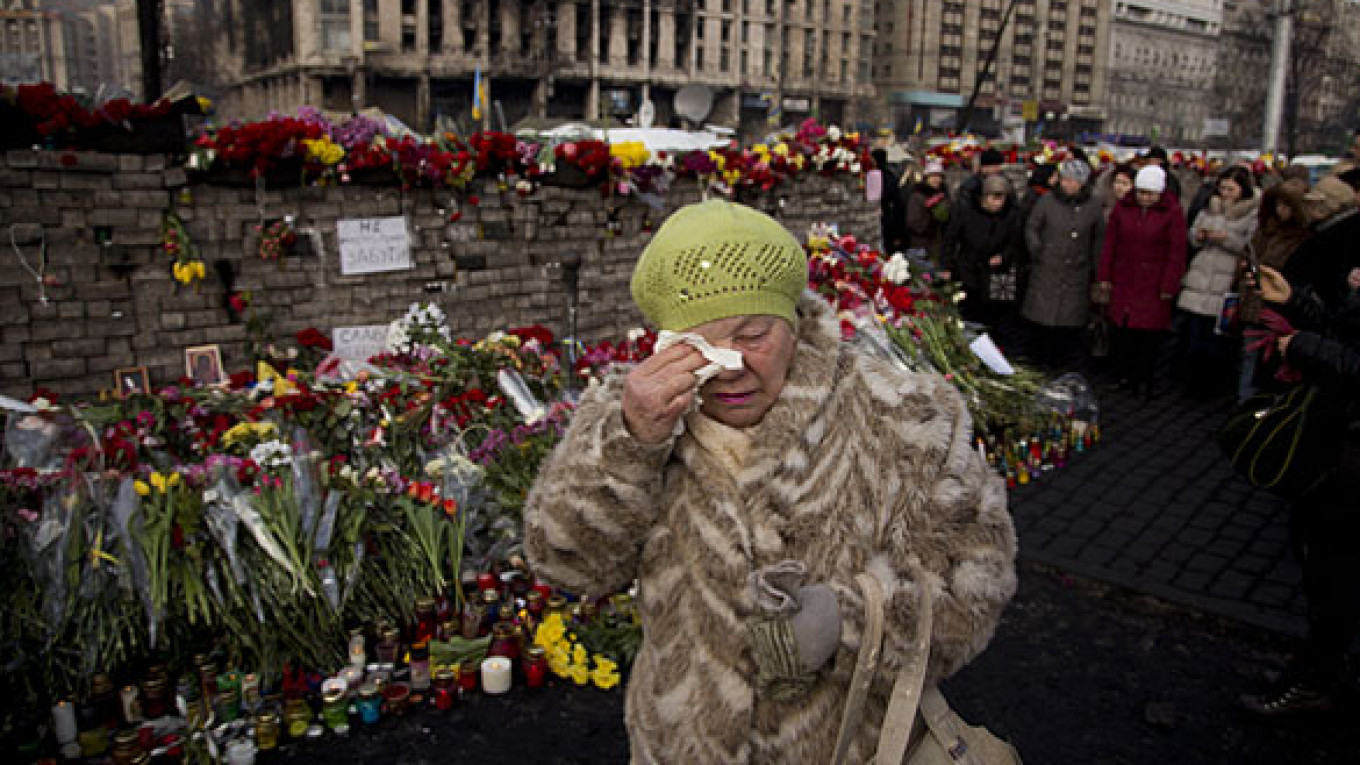KIEV, Ukraine — Ukraine's new authorities issued an arrest warrant on Monday for mass murder against ousted President Viktor Yanukovych, who is on the run after being toppled by bloody street protests in which police snipers killed opposition demonstrators.
Russia, Yanukovych's main backer, cast doubt on the legitimacy of the new Ukrainian authorities, declaring that Russian citizens' lives were under threat there, and contacted NATO to express concern.
European Union foreign policy chief Catherine Ashton arrived in Kiev to discuss measures to shore up the ailing economy, which the finance ministry said needs urgent financial assistance to avoid default.
The EU has contacted the U.S., Japan, China, Canada and Turkey to coordinate aid for Ukraine, a senior European Commission official said. France's foreign minister said an international donors' conference was being discussed.
Yanukovych, 63, who fled Kiev by helicopter on Friday, was still at large after heading first to his power base in the east, where he was prevented from flying out of the country, and then diverting south to Crimea, acting Interior Minister Arsen Avakov said.
"An official case for the mass murder of peaceful citizens has been opened," Avakov wrote on his Facebook profile. “Yanukovych and other people responsible for this have been declared wanted."
Yanukovych had left a private residence in Balaklava, in pro-Russian Crimea, for an unknown destination by car with one of his aides and a handful of security guards, Avakov said.
It was an ignominious political end for Yanukovych, who has been publicly deserted by some of his closest erstwhile allies, stripped of his luxury residence near Kiev and had to witness the release from prison of his arch-rival Yulia Tymoshenko.
On Independence Square in central Kiev, the cradle of the uprising, barricades of old furniture and car tires remained in place, with smoke rising from camp fires among tents occupied by diehards vowing to stay until elections in May.
The mood among the few hundred on the square was a mixture of fatigue, sorrow for the more than 80 people killed last week, and a sense of victory after three months of protests.
A large video screen by the side of the stage showed the faces of the dead, one after another, on a loop.
"Now is not the time for celebrating. We are still at war. We will stay here as long as we have to," said Grigory Kuznetsov, 53, dressed in black combat fatigues.
Galina Kravchuk, a middle-aged woman from Kiev, was holding a carnation. "We are looking to Europe now. We have hope. We want to join Europe," she said.
New Law
A day after Yanukovych fled, parliament named its new speaker, Oleksander Turchinov, as interim head of state. An ally of Tymoshenko, he aims to swear in a government by Tuesday that can run things until a presidential election on May 25.
Whoever takes charge faces a huge challenge to satisfy popular expectations and will find an economy in deep crisis, with state debt payments of about $6 billion due this year.
The Finance Ministry said it needed $35 billion in foreign assistance over the next two years and appealed for urgent aid in the next one or two weeks. It called for a donors' conference involving representatives of the EU, the U.S. and the International Monetary Fund.
French Foreign Minister Laurent Fabius told reporters in Beijing the idea was under discussion and "this should be worked out in the coming days."
The cost of insuring Ukraine's debt fell on hopes that the country would now receive aid and avoid default, while bonds recorded gains on expectations that a new government would focus on the economy.
Ukrainian stocks soared to their highest since September 2012, but the hryvna currency tumbled to a five-year low against the dollar as expectations grew that the new government would focus on using dwindling foreign reserves to repay debt rather than defend the currency.
Scuffles in Crimea and some eastern cities between supporters of the new order in Kiev and those anxious to stay close to Moscow revived fears of separatism. A week ago those concerns were focused on the west, where Ukrainian nationalists had disowned Yanukovych and proclaimed self-rule.
A Message from The Moscow Times:
Dear readers,
We are facing unprecedented challenges. Russia's Prosecutor General's Office has designated The Moscow Times as an "undesirable" organization, criminalizing our work and putting our staff at risk of prosecution. This follows our earlier unjust labeling as a "foreign agent."
These actions are direct attempts to silence independent journalism in Russia. The authorities claim our work "discredits the decisions of the Russian leadership." We see things differently: we strive to provide accurate, unbiased reporting on Russia.
We, the journalists of The Moscow Times, refuse to be silenced. But to continue our work, we need your help.
Your support, no matter how small, makes a world of difference. If you can, please support us monthly starting from just $2. It's quick to set up, and every contribution makes a significant impact.
By supporting The Moscow Times, you're defending open, independent journalism in the face of repression. Thank you for standing with us.
Remind me later.






